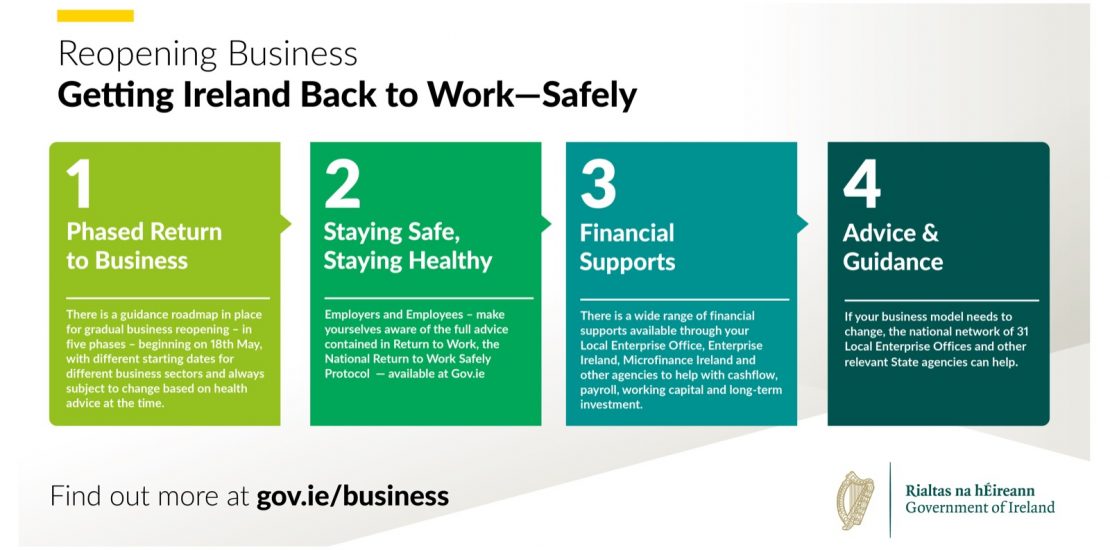- June 22, 2020
- Posted by: SBA Team
- Category: Uncategorized

As the country is beginning to move through the phases to ease COVID-19 restrictions and re-open Ireland’s society and economy, there will still be a requirement for providing a safer working environment for all businesses. We will still all need to continue practicing social distancing and protecting each other.
The COVID-19 (coronavirus) pandemic has affected every business in Ireland in the last few months, but each one has been impacted differently. Some businesses were able to continue working from home, however others have had to close their doors and stop working completely. Irrespective of this, all businesses will still be faced with a number of challenges in order to get back up and running to the new normal. This blog aims to give some advice to help you get your business ready to re-open.
Be Educated
Before re-opening try to learn as much as you can about COVID-19 and the information that is out there. There’s an enormous amount of information available, but we would recommend sticking to reputable and reliable sources in order to be guaranteed to have the right information for your business. Gov.ie is a website we would definitely recommend browsing and learning from for Irish businesses.
Be Organised
Being organised and prepared is vital in advance of re-opening. You will not be able to re-open instantly without having a plan in place analysing the internal and external factors that may impact your business.
Depending on the area or industry your business is in, your re-opening steps will vary. One thing we do recommend is to look at the Governments Roadmap for re-opening society and business and keep an eye out for updates. This will give you a guideline as to when your business can re-open. We also recommend having a plan in place in order to meet the Public health measures recommendations set by the government.
Health & Safety
Your number one priority for re-opening at this time is health and safety. That includes the health and safety of both your employees and customers. No matter what your business is, you need to take the necessary precautions to help reduce the risk of spreading the virus in your business. Below are some things you need to consider before re-opening:
- Hygiene – You need to have a plan in place for how good hygiene practices will be enforced. Employees should be reminded to frequently wash their hands, while both employees and customers need to be more aware if coughing or sneezing, to ensure they are doing it into their elbow or tissue. We would recommend having hand sanitizer for both employees and customers when entering your premises also and looking at your general cleaning and sanitation methods to see if these can be improved.
- Personal Protective Equipment (PPE) – It may be necessary for your employees to wear face masks and gloves. If this is the case, it should be encouraged and if possible, should even be provided for your employees.
- Social Distancing – Social distancing will have to be encouraged when you re-open. In order to ensure social distancing, you may need to look at changing the layouts of your offices or work spaces, closing communal spaces and even staggering shifts and lunch breaks. You may also need to install a physical barrier at points where employees and customers will be interacting such as tills, receptions, waiting rooms, between desks etc. Direct Blinds Cork are offering an excellent solution for this. They are offering a Transparent Hygiene Roller Shield which can be rolled up and down when required and can be a far better and safer option than rigid Perspex.
- Have a Plan in Place – It’s vital you develop a plan in order to be prepared for a positive COVID-19 case in your business once you re-open. Staff should be made aware of this plan, and what steps need to be taken if they have any symptoms. We would recommend reiterating your sick time policies in order to discourage employees coming to work if they do have symptoms.
Communication
At this time, consistent and clear communication is key. Employees, customers and any suppliers will need to be made aware of your plans and policies in advance of re-opening.
- Employees – We recommend keeping your employees updated and in the know of your re-opening plans. Once you are set to re-open you will need to give employees accurate information on changes that will be happening to help reduce the risk of spreading the virus, and also the health and safety procedures that will be in place. We would recommend to invite any questions as employees may have concerns.
- Customers – All customers should appreciate that there will be changes to the way your business will be operating at this time, but they will expect to be updated on re-opening dates and times, health and safety measures you will be adopting and any other helpful information. We’d recommend using multiple channels to get the message across including your company website, social media platforms and even posters at the entrance to your business outlining the necessary information.
- Suppliers / Partners – Communication is key with each of your suppliers or partners. Every business has been affected during the last few weeks so we recommend taking the time to talk to each of them to review your agreements and contracts to see if there are any changes. There may be longer lead times or other temporary changes you will need to adjust to.
Avail of Government Supports
There are several different government support grants available to help businesses during this challenging time. If you are eligible for these grants you should avail of them in order to help limit the damage of COVID-19 to your business.
In particular there is a restart grant which provides direct grant aid to both micro and small businesses. The aim of this grant is to help businesses with all the costs associated with re-opening their business post COVID-19. This grant is equivalent to the rates bill of the business from 2019 or a minimum of €2000, with a maximum grant of €10,000. You can apply now through your local authority website.
